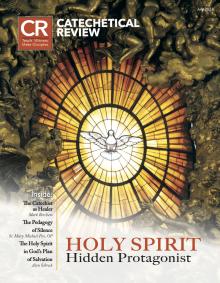“If we can nurture in a [person] the emergence and the victory of spiritual liberty, we have accomplished our task. If not, all is lost and the Christian life will weaken into childishness; it will harden into formalism; and finally it will disappear.” —Jean Mouroux, From Baptism to the Act of Faith
In 1986, everything changed in my Catholic life. I was 15 years old. I had grown up in a home where I was loved. We went to Mass every Sunday, and I had progressed through parish catechesis. This change didn’t come about because I was suddenly being catechized by the twentieth-century version of St. Catherine of Siena or St. Charles Lwanga. In fact, this change had little to do with my catechists. It happened at the Holy Thursday liturgy.
Just four days earlier, on Palm Sunday, our pastor had issued an impassioned invitation to attend the Triduum liturgies of Holy Thursday, Good Friday, and the Easter Vigil. Ordinarily, I would never have considered such a thing. But there was something in his words that moved me. I decided to respond to his invitation and go.
That Holy Thursday liturgy was strikingly beautiful. When the pastor held up the Eucharist and said, “This is my body,” for the first time in my 15 years of life I truly saw who this was. And, as I stepped forward to receive the Eucharist, for the first time I did so from a place of interior freedom and desire. I perceived that I was being offered an immense gift from God. We were then invited to stay with Jesus in the Blessed Sacrament and pray until midnight. Recognizing now the true meaning of Eucharistic adoration, I chose to stay. I remained with Jesus deep into Holy Thursday night.
On that holy night, my life moved onto a new trajectory. How did this happen? Looking back, I can clearly see a series of invitations extended to take steps forward. And, on that holy night, I chose, from my own inner place of freedom, to respond.
The Church points out an unmistakable characteristic in how Jesus taught in the Gospels: “In all the various means he employed to teach about who he was, Jesus evoked and elicited a personal response from his hearers.”[1] I believe deeply that catechists today must propose life in Christ and allow for the possibility of a response of faith from those we teach. If they are to become disciples, in small and significant ways, they will do so through a series of choices. Otherwise, it is too easy to remain passive.
For catechists, this can be frightening. Worried over a potential negative response, we can instead over-plan our catechesis to the point that there is no opportunity for responsiveness. In this, I believe our Lord’s words are particularly reassuring: “Be not afraid!”
In this work of forming authentic disciples through catechesis, he does not abandon us. Rather, he gives us the most extraordinary of gifts, the Holy Spirit. The Church encourages us on this point: “The true protagonist of all authentic catechesis is . . . the Holy Spirit, who by means of the profound union with Jesus Christ which is nurtured by every catechist, gives efficacy to human efforts in catechetical activity.”[2]
That last point is crucial: It is the Holy Spirit who gives efficacy to our efforts. We could say two things here. First, we must be attuned to the Holy Spirit in every aspect of our catechetical work, from lesson planning to teaching. We must also help our students enter into and become familiar with this place of attunement. The time we spend in an opening prayerful encounter with God as we begin catechesis is invaluable to this goal. Second, the response of faith is not something we can do for our students. It only happens in freedom. It is from deep within those places of personal freedom that the Holy Spirit moves and acts. We must pray for our students, that they might be responsive to the Holy Spirit alive in them, who will lead them to the truth, who is Christ.
I see this dynamic clearly now when considering my own first responses as a 15-year-old disciple-in-the-making. Perhaps you can see the movement of the Holy Spirit in your own experiences of stepping forward. May we be renewed in our attentiveness to his leading, that we may show our students how they, too, can freely move forward in faith.
Dr. James Pauley is Professor of Theology and Catechetics at Franciscan University and author of two books focused on the renewal of catechesis: An Evangelizing Catechesis: Teaching from Your Encounter with Christ (Our Sunday Visitor, 2020), and the revised edition of Liturgical Catechesis in the 21st Century: A School of Discipleship (Liturgy Training Publications, 2022).
Notes
[1] Pontifical Council for the New Evangelization, Directory for Catechesis (Washington, DC: United States Conference of Catholic Bishops, 2020), no. 161.
[2] Ibid., no. 112.
This article originally appeared on page 6 of the print edition.
This article is from The Catechetical Review (Online Edition ISSN 2379-6324) and may be copied for catechetical purposes only. It may not be reprinted in another published work without the permission of The Catechetical Review by contacting [email protected]


















